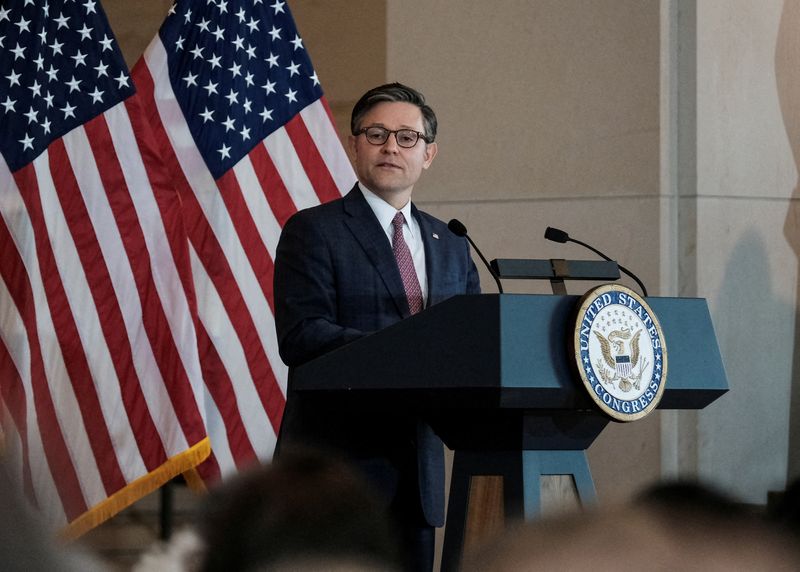By Raphael Satter, Christopher Bing
WASHINGTON (Reuters) -U.S. House of Representatives Speaker Mike Johnson has failed three times in the past five months to reauthorize a provision of a key spy power known as Section 702, with lawmakers citing reservations over how the authority empowers warrantless domestic surveillance.
Here's a look at what Section 702 does, why so many legislators want it changed, and what happens if it expires.
WHAT IS SECTION 702 AND WHAT DOES IT DO?
Section 702 of the Foreign Intelligence Surveillance Act, or FISA, is one of a suite of authorizations passed after the Sept. 11, 2001, attacks that allow American spy agencies to surveil foreigners abroad using data drawn from U.S. digital infrastructure such as internet service providers. The information is used to track enemy spies, rogue hackers and extremist militants.
The data gathered by the program, however, often includes communications to or from Americans, and can be mined by domestic law enforcement bodies such as the FBI without a warrant.
That practice has alarmed libertarian and privacy-concious lawmakers - both Republicans and Democrats. Recent revelations that the FBI used this power to hunt for information about Black Lives Matter protesters, congressional campaign donors and U.S. lawmakers have raised further doubts about the program's integrity.
WHAT DO REFORM ADVOCATES WANT?
Requiring a judge's sign-off on searches and surveillance is a key part of how the U.S. preserves personal liberty from potential encroachment by state power, said Jake Laperruque of the nonprofit, Washington-based Center for Democracy and Technology. Using an espionage authority aimed at foreigners to short-circuit that arrangement "just goes against the basic principle of how we balance privacy and security in this country," he said.
Overlapping congressional reform proposals would force the FBI and others to seek judicial authorization before exploiting the information gathered by the vast U.S. spy apparatus. And while there are other proposed reforms - like a ban on U.S. intelligence agencies circumventing constitutional protections by buying sensitive information on Americans from commercial data brokers - Democratic and Republican lawmakers alike have made "get a warrant" their rallying cry.
"If the warrant requirement doesn't go in the legislation, I ain't supporting it," Republican hardline congressman Jim Jordan told colleagues at a hearing in February.
Intelligence officials have bristled at the idea. Glenn Gerstell, a former general counsel of the National Security Agency, said the campaign to require warrants was misguided and dangerous.
"This would be devastating to our efforts to stop international drug trafficking, Chinese espionage on American soil and Russian ransomware gangs targeting American companies," he said.
Whatever its merits, Speaker Johnson, a Republican, has repeatedly sidelined efforts to bring the proposed reforms to a vote, instead trying to push through versions of the reauthorization bill favored by the intelligence community.
WHAT HAPPENS IF THE PROVISION SIMPLY EXPIRES?
The President's Intelligence Advisory Board has said letting 702 expire would be "one of the worst intelligence failures of our time." A wholesale scrapping of the authority seems unlikely. Johnson has said "it's too important to national security" to abandon the reauthorization effort. Even critics of the bill generally favor reforms rather than scrapping the authority altogether.
Laperruque agreed that Section 702 provided value to the intelligence community, but he cautioned that it wasn't unusual for officials to dial up the hysteria when Congress threatened to water down their surveillance powers.
"We saw that on the same thing with the legislation that got pushed after the Snowden disclosures," he said, referring to U.S. intelligence contractor Edward Snowden's revelations that the National Security Agency was secretly sweeping up millions' of Americans' phone call records and lying about it. Outraged lawmakers moved to shut it down, only to be told by the government that "it's essential, it's important, it would be a disaster for national security if we stopped the global bulk collection authority," Laperruque said.
Congress pulled the plug on bulk collection anyway, "and lo and behold the sky didn't fall," he said.
